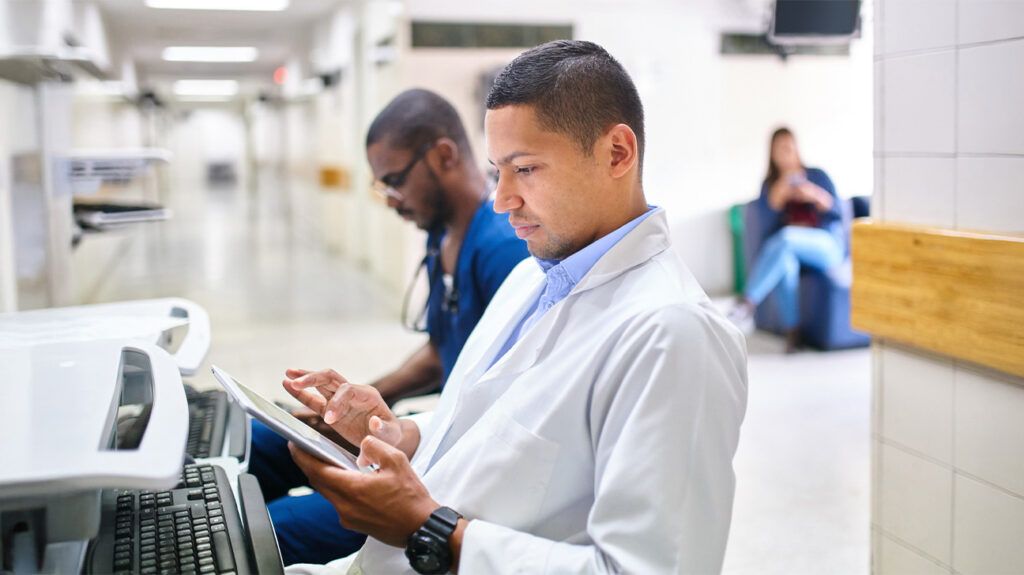Hematologist-oncologists are doctors who specialize in treating blood cancers such as acute lymphoblastic leukemia (ALL).
ALL is a rare, rapidly progressing cancer of the blood and bone marrow. The bone marrow makes too many white blood cells, leading to extreme tiredness, high body temperature, and a tendency to bruise or bleed easily. ALL can spread to the brain and nervous system and tends to get worse quickly unless a person receives prompt treatment.
A specialist with experience in ALL can help to guide treatment, inform the individual, and set realistic expectations around the outlook and likely progress of treatment.

A doctor who specializes in treating ALL is known as a hematologist-oncologist. People who live in an area that does not have this type of specialist available can visit their nearest cancer specialist, who may be able to work with a hematologist-oncologist to map out the most effective treatment.
Hematologists are doctors who specialize in internal medicine, with a focus on treating diseases that affect blood. Oncologists specialize in treating cancers.
According to data from the Association of American Medical Colleges, as of 2021, almost 16,700 active physicians in the United States combine these disciplines as hematologists-oncologists.
In the United States, ALL is rare, accounting for less than
Learn more about acute lymphoblastic leukemia.
Choosing an ALL specialist may start with picking a specific doctor or visiting a nearby facility. The decision process usually depends on an individual’s location, knowledge of local facilities, and preference. Some people may rely on local services if they cannot travel out of their county or state.
A person’s insurer might also have a specific network of approved doctors through which they will pay for all or some of a person’s treatment. Individuals might also need a referral from a primary care physician before insurers will consider funding care.
People should speak to their provider or check their policy documents for their insurer’s rules around provider networks and referrals.
Resources for finding a hematologist-oncologist
The following resources can help people find the ALL specialist who suits them:
- Ask a primary care physician to recommend a hematologist-oncologist or appropriate facility in the area.
- Get in touch with a local community cancer center.
- Contact insurance or doctor referral services.
- Phone a Leukemia and Lymphoma Society Information Specialist at 800-955-4572
Several online directories are available for help with finding appropriate board certified physicians, including:
- The American Board of Medical Specialties (ABMS): The ABMS can help connect people with board certified specialists, including hematologist-oncologists.
- The American Society of Hematology (ASH): The ASH offers a find a hematologist service that can help people with ALL match with appropriate hematologists in their local area.
Knowing what to ask or consider when meeting with a specialist can help a person choose the right doctor for them and understand their treatment plan better.
People should consider asking the specialist whether they are happy to have the session recorded. Alternatively, bring a laptop or notebook to take notes or have a friend or family member attend the session to take notes and provide emotional support where necessary.
Ask the hematologist-oncologist about the following to get a sense of their expertise and field of experience:
- their board certification and licensing status
- any professional societies to which they belong
- their experience with treating ALL directly
- the accreditation of their facility, and how often their facility treats people with ALL
- the expected waiting time for appointments or callbacks
- the availability of case managers, social workers, and nursing staff to support questions around quality of life
- whether they recommend speaking to other hematologist-oncologists
- when they are available for contact, and which queries an individual should instead refer to their family physician
- the best way to contact them directly
- how to access care out-of-hours
Be sure to ask a specialist about the results of any diagnostic treatments, what treatment options look like, and what the likely results of treatment will be.
Second opinions can help people to be sure about their diagnosis and feel more confident about the proposed treatment plan. People who do not need immediate treatment for aggressive leukemia and who have the following questions may wish to consider visiting another specialist for a second opinion:
- Does their insurer require a second opinion before they will pay for treatment?
- Is the individual confident that they have considered all of their options before committing to a treatment plan?
- Does the individual have a rare leukemia subtype?
- Does the person with leukemia feel that the doctor is underplaying the severity of the cancer?
- Do they think other treatments may be available that their current doctor is not offering?
- Does the individual’s current hematologist-oncologist not specialize in their type of leukemia?
- Has the doctor suggested more than one treatment option?
- Are there barriers to understanding or communicating with their doctor?
Some people may wish to get a second opinion simply to verify their diagnosis and make sure they are choosing the right treatment plan.
People should contact their insurer to find out whether the policy covers second opinions. According to the Leukemia Research Foundation, most insurers pay for a second opinion on a leukemia diagnosis.
Leukemia resources
Visit our dedicated hub for more research-backed information and in-depth resources on leukemia.
How serious is acute lymphoblastic leukemia?
ALL progresses quickly without treatment. However, the outcome depends on the subtype of ALL, as well as the
Can you fully recover from acute lymphoblastic leukemia?
Most children with ALL recover fully, and remission times for adults have become much longer for adults over the last 30 years.
A hematologist-oncologist specializes in blood cancers such as acute lymphoblastic leukemia (ALL). A person seeking ALL treatment may be able to find one through physician recommendations or referrals, their insurer’s network, the local cancer care community center, or the relevant medical association directories.
Upon connecting with a hematologist-oncologist, be sure to ask about their certifications, experience, expertise, and general patterns and expectations around communication. It might also help to get a second opinion to give you more confidence about the treatment plan or diagnosis.


